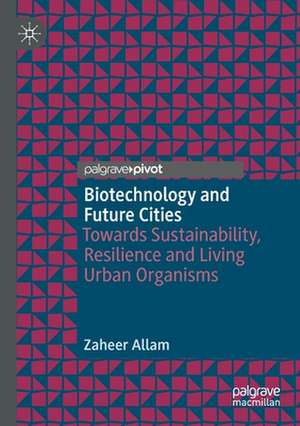Biotechnology and Future Cities: Towards Sustainability, Resilience and Living Urban Organisms
Autor Zaheer Allamen Limba Engleză Paperback – 31 mar 2021
This new concept will open up exciting avenues to providing novel solutions for climate change mitigation. The book goes on to address various potential concerns and discusses what regulatory frameworks would be needed to safely implement such a concept. It will be a useful tool for planners, policy makers and engineers as well as for researchers with in interest in the future of our cities.
| Toate formatele și edițiile | Preț | Express |
|---|---|---|
| Paperback (1) | 376.22 lei 6-8 săpt. | |
| Springer International Publishing – 31 mar 2021 | 376.22 lei 6-8 săpt. | |
| Hardback (1) | 384.31 lei 6-8 săpt. | |
| Springer International Publishing – 31 mar 2020 | 384.31 lei 6-8 săpt. |
Preț: 376.22 lei
Nou
Puncte Express: 564
Preț estimativ în valută:
71.99€ • 75.02$ • 59.61£
71.99€ • 75.02$ • 59.61£
Carte tipărită la comandă
Livrare economică 03-17 aprilie
Preluare comenzi: 021 569.72.76
Specificații
ISBN-13: 9783030438173
ISBN-10: 3030438171
Pagini: 90
Ilustrații: XV, 90 p. 11 illus., 10 illus. in color.
Dimensiuni: 148 x 210 mm
Greutate: 0.14 kg
Ediția:1st ed. 2020
Editura: Springer International Publishing
Colecția Palgrave Macmillan
Locul publicării:Cham, Switzerland
ISBN-10: 3030438171
Pagini: 90
Ilustrații: XV, 90 p. 11 illus., 10 illus. in color.
Dimensiuni: 148 x 210 mm
Greutate: 0.14 kg
Ediția:1st ed. 2020
Editura: Springer International Publishing
Colecția Palgrave Macmillan
Locul publicării:Cham, Switzerland
Cuprins
Chapter 1 - Biotechnology to render future cities as living and intelligent organisms.- Chapter 2 - The Triple B: Big data, biotechnology and biomimicry.- Chapter 3 - Revisiting energy policy and planning in future living cities.- Chapter 4 - On gene editing and the conflicts between biodiversity and urban liveability.- Chapter 5 - Biometrics, privacy, safety and resilience in future cities.
Notă biografică
Zaheer Allam works as an Urban Strategist for the Port Louis Development Initiative (PLDI), Mauritius and the Global Creative Leadership Initiative. He is the African Representative of the International Society of Biourbanism (ISB) and a member of the Advisory Circle of the International Federation of Landscape Architects (IFLA). He was elevated, by the President of Mauritius, to the rank of Officer of the Order of the Star and Key of the Indian Ocean (OSK); the highest distinct order of Merit in Mauritius.
Textul de pe ultima copertă
This book explores how biotechnology can lead to the reimagination of cities. In a time where the increasing adoption of technology by cities is leading to unsustainable environmental and economic concerns, biotechnology has enabled new ways of envisioning data and energy storage. Zaheer Allam thus revisits the popular concept of Smart Cities -and its associated Internet of Things (IoT) to explore how the biological sciences, coupled with technology, can be applied to cities; and in doing so, create living urban organisms on an unprecedented scale. This new concept will open up exciting avenues to providing novel solutions for climate change mitigation. The book goes on to address various potential concerns and discusses what regulatory frameworks would be needed to safely implement such a concept. It will be a useful tool for planners, policy makers and engineers as well as for researchers with in interest in the future of our cities.
Zaheer Allam works as an Urban Strategist for the Port Louis Development Initiative (PLDI), Mauritius and the Global Creative Leadership Initiative. He is the African Representative of the International Society of Biourbanism (ISB) and a member of the Advisory Circle of the International Federation of Landscape Architects (IFLA). He was elevated, by the President of Mauritius, to the rank of Officer of the Order of the Star and Key of the Indian Ocean (OSK); the highest distinct order of Merit in Mauritius.
Caracteristici
Introduces a novel perspective on the current urban narrative Revisits and expands the concept of smart cities Explores how biological sciences coupled with technology can turn cities into living organisms of unprecedented scale
